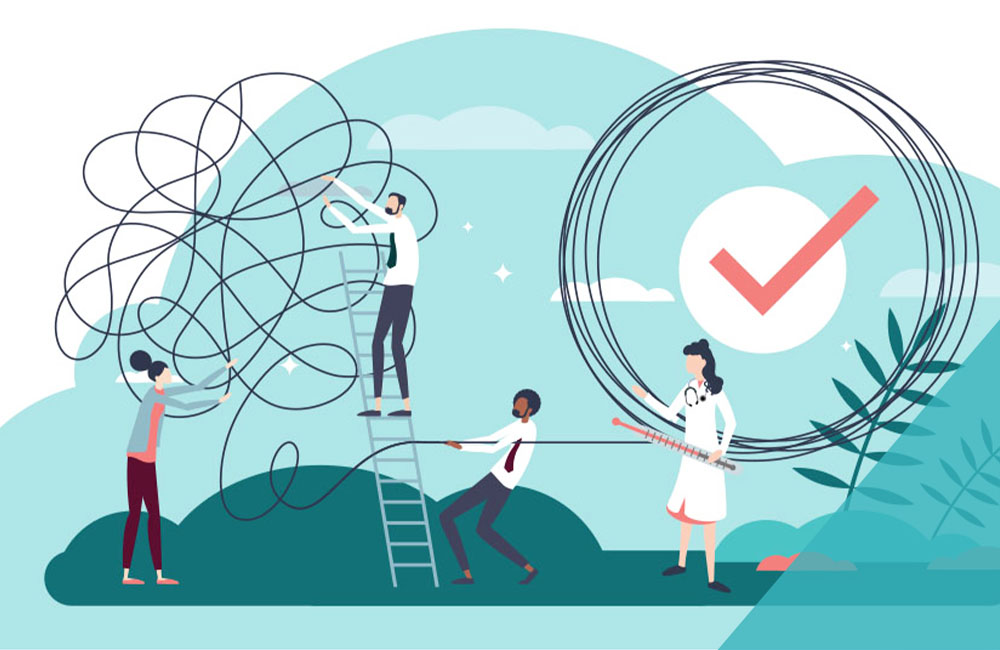
Well-being in the Workplace – A Framework for Well-being Initiatives in Your Company
Supporting mental and emotional well-being in the workplace is one of the largest growing trends of our time. The market for mental and emotional well-being support, referred to as “Transformational Technology” has market estimates for consumer demand in the hundreds of billions1.
Yet mass adoption and understanding are not at the levels that reflect these trends. Which is understandable when looking at the adoption curve of physical fitness after WWII and the adoption curve of nutritional fitness throughout the 80s and 90s. Personal growth and self-care practices take time to grab hold as initially people are fearful and skeptical of the benefits.
Google’s Head of Personal Growth and Founder of the “Search Inside Yourself Leadership Institute” Chade-Meng Tang recently stated, “Within companies there is a growing awareness of the importance of employees “emotional fitness”, mirroring the same journey of acceptance that physical fitness exercise took in the last century”2.
While employers recognize that Well-being in the workplace is now more important than ever,. External Link. Opens in new window. considering well-being initiatives for your company can be overwhelming. There is ample research highlighting that while developing talent skills is important, developing well-being is increasingly being intertwined into the employee development offering3. Research exists highlighting the growing recognition of the interrelationships between talent development and individual well-being in both the employer experience and overall workplace planning3.
With all this information, where does one start, how do you become more informed around what is right for your company and implement initiatives all the while tracking and understanding the benefits? Holistic programs sound nice but, because of the siloed nature of many organizations, can be daunting to implement. It is hard enough for some companies to support one wellness program across its organization due to how independently certain divisions, department or offices operate, let alone a company-wide well-being program.
The following framework around initiatives & engagement can be useful to small or large organizations interested in pursuing a well-being in the workplace strategy.
#1 – Guidance, Framing & Education
This information may be new or unfamiliar. Consider working with an expert who has the ability to communicate a deep understanding of this space customizing it for your company, why it is important and how best to deliver the message with relevant supporting content, research, expert input and societal trends in a manner that is real, relatable and accessible.
#2 – Pacing
Adoption will take time. Initial focus should be on listening, educating and building awareness. Take time to understand what is right for your company’s culture; understand the needs and obstacles that exist, where stigmas may lie and set a roll-out plan best suited for your environment.
#3 – Creativity, Curation & Excitement
Bring in experts & thought leaders to help ground topics, curate group events, exercises and lectures based on specific needs and interest, package resources & information in a relevant way and understand what stimulates excitement and triggers boredom.
#4 – Needs Assessment, Data & Success Metrics
Perform needs assessment through surveys, one-on-one and group discussions highlighting where, how and in what ways mental & emotional well-being support is most useful. Set your goals & objectives and gather data (no matter how basic) as it will help build confidence and trust in the process.
#5 – Champions & Early Adopters
Leadership and stakeholder buy-in will play a crucial role in de-stigmatizing initiatives and spur adoption. Who within your company has an established practice, a voice that people gravitate towards or a leadership position of influence? Empower them to lead, share their stories and be a part of the creative process.
#6 – Change is OK
What may work at one point in time for your company, may shift at a later date. Be open to the dynamic nature of your initiatives mirroring the needs of your employees as they grow and evolve, the times as they change and the advancements in our understanding and comfort in this space.
#7 – Keep Employees Engaged and Informed
Summarize data and findings sharing often, continue to find creative ways to keep employees educated and informed and focus on building a culture that values personal growth as more and more employees require that of their employers.
Building awareness and implementing well-being initiatives in your company is a process that takes time, but you’re not alone. Major sports teams, Fortune 500 companies, leading institutions and non-profits are all dedicating significant resources in the form of time & capital towards understanding and implementing these initiatives as the returns are significant. Price Waterhouse Coopers. External Link. Opens in new window. estimates that for every $1.00 spent on creating a mentally and emotionally healthy workplace, companies can recoup $2.30 in benefits gained by the organization4.
Lean on outside expertise, empower champions & early adopters within and make it a priority so that you achieve the benefits & change in company culture that is readily available, improving the bottom line and more importantly the lives of your employees & their families throughout your organization.
I M Human. External Link. Opens in new window. helps companies and organizations support the emotional well-being of their employees and implement actionable and measurable initiatives.
Learn More About Well-Being in the Workplace
- Look to the Community to Build a Results-Oriented Wellness Program
- The Wellness Payoff
- Well-Being in the Workplace, Is Now More Important Than Ever. External Link. Opens in new window.
- Manufacturing Executive Makes Business Case for Wellness Programs
[box]
SOURCES USED
1 Techcrunch – Science and technology will make mental and emotional wellbeing scalable, accessible, and cheap – Nichol Bradford – October 17, 2016
2 The Guardian – Google’s head of mindfulness: ‘goodness is good for business’ – Jo Confino – May 14, 2014
3 Deloitte University Press – Unlocking human potential – February 2017
4 Price Waterhouse Cooper – Creating a Mentally Healthy Workplace – May 2014
[/box]








